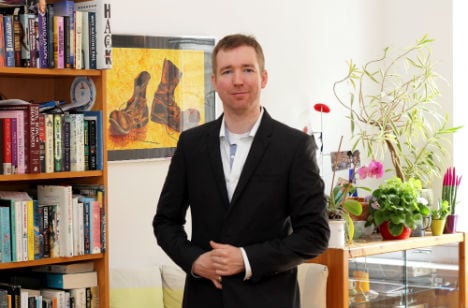A shift in Tattersall’s outlook on life occurred after he sought out and got involved with the expat community in Vienna. After a decade of participation, Tattersall now volunteers with the non-profit organization Vienna Expats, where he serves as a moderator.
How did you end up in Vienna?
About ten years ago, I met an Austrian girl while I was living in Germany. We got on well, so I asked her to come and live with me in Germany. She said no because she preferred Austria, specifically Vienna, so the next day, I quit my job and moved to Vienna with no work lined up.
I didn’t know anybody except my girlfriend and a few of her friends, so I did some research on my own and looked for events and groups to join in town where I could meet new people. I found a few expat groups and I went to a number of events regularly. The Vienna Expats group turned out to be the one where I felt the most relaxed and the people were very friendly. Soon enough, the people I met really made an important difference in my life at that time.
I used to spend time just walking around alone in the streets of Vienna, which was a very isolated way to live in a vibrant, really interesting, lots-of-things-to-do sort of place. It was incredibly hard being on my own.
What are some of the other reasons expats are attracted to Vienna?
I think a lot of people choose Vienna because it’s a capital of culture – it’s a really interesting place with fantastic architecture and it's well organized. Maybe it feels like a holiday for some, and their time in the city is often treated like a holiday experience, but many decide to spend a significant amount of their lives here.
The most normal reasons for people to leave their own country and come to a new one is for socio-economic reasons – if they get a job abroad, this comes up fairly regularly. Others are here for love and decide to stay on whether their relationship works out or not. I’ve made many good friends through the expat service who came here because of love and after 6 months or a year their relationships broke down, and suddenly, they need to find a new apartment and new friends and support in general. And what do they do? They do some research just like I did, and usually, find the Vienna Expat group fairly quickly.
How did your casual involvement with Vienna Expats turn into a leadership position?
They asked me to join the Moderators about six years ago because of how active I was both online and at our events. The reason I do it is that I meet people from all around the world – it’s my raison d’être, in other words. I do it to give back to the expat community that I feel affiliated with and that helped me to integrate and organize myself in the early years. And I like to take that experience that I’ve built up, buying property, living in this country, dealing with the medical insurance system, and all the other complex things in life and help others.
Since becoming a moderator, I’ve been organizing events and doing work on the web forums. This is where international visitors who come to Vienna can ask questions or they can browse the older conversations that have been posted.
It’s interesting because our site is visited fairly frequently, with around one million hits a year, and the forums are very popular. To throw some statistics out there, we have about 5,500 topics going in our forums, about 60,000 posts in total, and about 9,000 members of which about 1,200 are active in any one year.
Check out the Vienna Expats group on Facebook: https://www.facebook.com/ViennaExpats
By Negina Pirzad



 Please whitelist us to continue reading.
Please whitelist us to continue reading.